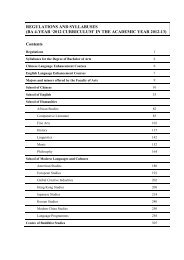Bachelor of Arts (BA) - The University of Hong Kong
Bachelor of Arts (BA) - The University of Hong Kong
Bachelor of Arts (BA) - The University of Hong Kong
You also want an ePaper? Increase the reach of your titles
YUMPU automatically turns print PDFs into web optimized ePapers that Google loves.
279PHIL2210.Metaphysics (6 credits)(This course is also <strong>of</strong>fered to second and third year non-<strong>BA</strong> students for inter-Faculty broadeningpurposes.)This course covers both the nature <strong>of</strong> reality and the nature <strong>of</strong> knowledge <strong>of</strong> it and treats the twoquestions as intrinsically connected. We shall examine a number <strong>of</strong> important theories <strong>of</strong> metaphysics,as well as anti-metaphysics, including those <strong>of</strong> Plato, Descartes, Hume, Kant, Nietzsche, Heidegger,and contemporary philosophers such as Habermas, Rorty and Putnam. We will treat these theories notonly as representing different views on metaphysics but also as forming a logical order <strong>of</strong> development.Assessment: 100% coursework (may include in-class test).PHIL2420.Chinese philosophy: metaphysics (6 credits)(This course is also <strong>of</strong>fered to second and third year non-<strong>BA</strong> students for inter-Faculty broadeningpurposes.)We study Chinese views <strong>of</strong> reality, human nature, language, wisdom and the relation <strong>of</strong> each to humansociety. Our main texts will be Daoist texts from the classical period, but we shall also discussNeo-Daoism, Buddhism and Neo-Confucian metaphysics.Assessment: 100% coursework (may include in-class test).PHIL2150.Philosophy and biology (6 credits)(This course is also <strong>of</strong>fered to second and third year non-<strong>BA</strong> students for inter-Faculty broadeningpurposes.)Charles Darwin's theory <strong>of</strong> evolution had a huge impact on the way we think about mankind's place inthe world. In this course we will discuss some <strong>of</strong> the philosophical consequences <strong>of</strong> this impact. Noprevious knowledge <strong>of</strong> the theory is required as we will begin with a critical introduction to itsdevelopment and main features. Later in the course we will also consider the contemporary debateconcerning the scope and limits <strong>of</strong> evolutionary theory.Assessment: 100% coursework (may include in-class test).PHIL2130.Philosophy <strong>of</strong> the sciences (6 credits)(This course is also <strong>of</strong>fered to second and third year non-<strong>BA</strong> students for inter-Faculty broadeningpurposes.)If we want to find out about the world around us, we look to science to provide the answers to ourquestions. But why? What justifies our faith in this enterprise? In this course, we shall investigate tworelated questions. First, what is scientific method? We shall examine answers ranging from the rigidprescriptions <strong>of</strong> Popper to the anarchism <strong>of</strong> Feyerabend. Second, what reason do we have to think thatthe explanations provided by science are true? Here the answers range from optimism based on thesuccess <strong>of</strong> science, to pessimism based on our repeated rejection <strong>of</strong> past theories. Along the way, weshall critically consider notions such as progress, objectivity, and the difference between science andnon-science. We shall examine how philosophical questions arise in actual scientific practice. Whatexamples are selected for this purpose will, to some extent, be determined by the interests <strong>of</strong> students.Assessment: 100% coursework (may include in-class test).<strong>The</strong>re are no prerequisites for this course.
















